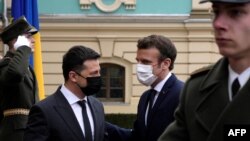French President Emmanuel Macron said Tuesday it could take months to resolve the crisis stemming from Russia massing 130,000 troops along its border with Ukraine.
“You must not underestimate the tension that surrounds the situation that we are living through, its unprecedented nature,” Macron said in Kyiv, where he met with Ukrainian President Volodymyr Zelenskiy.“I do not believe this crisis can be solved thanks to a few hours of discussions.”
Macron had spent five hours talking with Russian President Vladimir Putin in Moscow on Monday.
The French leader said his discussions with Putin had helped ensure that “there’s no degradation and no [further] escalation” of the standoff between Russia and Ukraine and the Western alliance supporting the Kyiv government.
“I believe for my part that there are concrete, practical solutions that will allow us to move forward,” Macron said after meeting with Zelenskiy.
Macron acknowledged the crisis is not over, saying, “In adopting this threatening posture, Russia decided to put pressure on the international community.”
Kremlin spokesman Dmitry Peskov said Tuesday there were “seeds of reason” in proposals Macron had made to Putin. Peskov, however, rejected suggestions the crisis had been resolved, saying, “So far, we don’t see and feel the readiness of our Western counterparts to take our concerns into account.”
“In the current situation, Moscow and Paris could not make a deal,” Peskov said. “France is an EU and NATO member. France is not leading NATO,” the 30-nation Western military alliance dominated by the United States.
NATO has rejected Moscow’s demands that it end its expansion into eastern Europe nearest Russia and eliminate the possibility of Ukraine, a one-time Soviet republic, from joining NATO. The West says it is willing to negotiate over the positioning of missiles in eastern Europe and NATO troop maneuvers.
On Monday night, the Russian leader refused to rule out the possibility of invading Ukraine, while leaving the door open to further diplomacy. Putin said he would speak with Macron again by phone after the French president’s talks with Zelenskiy.
For his part, Zelenskiy said after discussions with Macron that he wants Putin to exhibit good intentions by pulling back troops from the Ukrainian border.
“Openness is always great, if it’s true, and not a game, but serious openness, not a joke, and understanding that there is a serious danger,” Zelenskiy told reporters following his talks with Macron.
“I do not really trust words, I believe that every politician can be transparent by taking concrete steps,” Zelenskiy said.
Macron said both Putin and Zelenskiy committed themselves to honoring the Minsk Accords signed in 2014 and 2015 by the leaders of Ukraine, Russia, France and Germany. It was a response to Moscow’s 2014 unilateral annexation of Ukraine’s Crimea Peninsula, with the unmet goal of ending the fighting between Kyiv’s forces and Russian separatists in Ukraine’s eastern Donbas region. About 14,000 have been killed in the last eight years in the region.
“We have now the possibility of advancing negotiations,” Macron told reporters following his talks with the Ukrainian president.
Macron’s shuttle diplomacy was occurring as U.S. President Joe Biden met with German Chancellor Olaf Scholz in Washington on Monday, with both leaders saying they were united behind NATO’s threat to impose swift and severe economic sanctions on Russia if Putin attacks Ukraine.
Biden said Nord Stream 2, a new Russia-to-Germany natural gas pipeline running under the Baltic Sea, will not be made operational if Russia invades Ukraine, cutting off would-be lucrative revenue for Russia.
Scholz did not directly say whether Germany would cancel the pipeline project but said, “We will take all the necessary steps, and all will be done together” with the United States and other allies.
He said, “We have prepared a reaction that will help us to react swiftly if needed” in the event of a Russian invasion. He said Germany would not “spell out everything in public.”
Biden, at his news conference with Scholz, urged Americans in Ukraine to leave the country, saying, “It would be wise” for them to do so because of the possibility of a Russian attack.
The U.S. State Department already has said nonessential employees in Ukraine could leave the country along with family members.




